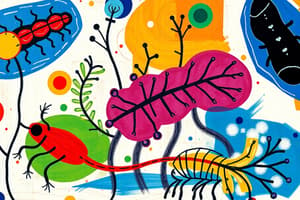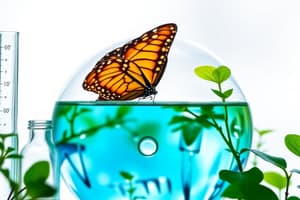Podcast
Questions and Answers
Which of the following statements accurately defines biology?
Which of the following statements accurately defines biology?
- The scientific study of life and living organisms. (correct)
- The exploration of Earth's physical environments.
- The examination of plant species only.
- The study of chemical reactions in organisms.
What characteristic of life refers to an organism's ability to respond to external stimuli?
What characteristic of life refers to an organism's ability to respond to external stimuli?
- Growth and development
- Adaptation / Evolution
- Metabolism
- Response to stimuli (correct)
Which of the following is the correct order of steps in the scientific method?
Which of the following is the correct order of steps in the scientific method?
- Hypothesis, analysis, observation, conclusion
- Question, hypothesis, conclusion, prediction, analysis
- Observation, question, hypothesis, prediction, experiment, analysis, conclusion (correct)
- Experiment, conclusion, observation, analysis
How should a proper hypothesis be structured?
How should a proper hypothesis be structured?
What is the base unit of volume in the metric system?
What is the base unit of volume in the metric system?
Which instrument is primarily used for observing small specimens in a laboratory setting?
Which instrument is primarily used for observing small specimens in a laboratory setting?
Which of the following correctly describes how to read a graduated cylinder?
Which of the following correctly describes how to read a graduated cylinder?
Which of the following is NOT one of the six kingdoms of living things?
Which of the following is NOT one of the six kingdoms of living things?
Flashcards
What is Biology?
What is Biology?
The scientific study of life and living organisms.
Define Homeostasis
Define Homeostasis
The ability of an organism to maintain a stable internal environment despite changes in its external environment.
What are the steps of the Scientific Method?
What are the steps of the Scientific Method?
Observation, question, hypothesis, prediction, experiment, analysis, conclusion.
How to write a hypothesis?
How to write a hypothesis?
Signup and view all the flashcards
What is the base unit of mass?
What is the base unit of mass?
Signup and view all the flashcards
What is the base unit of length?
What is the base unit of length?
Signup and view all the flashcards
What is the base unit of volume?
What is the base unit of volume?
Signup and view all the flashcards
What is the unit of measure for temperature?
What is the unit of measure for temperature?
Signup and view all the flashcards
Study Notes
Biology Exam Study Guide
- Biology Definition: The scientific study of life and living organisms.
Characteristics of Life
- Cellular Organization: Living things are composed of cells.
- Reproduction: Living things reproduce, creating new organisms.
- Metabolism: Living things use energy to carry out life processes.
- Homeostasis: Maintaining a stable internal environment.
- Heredity: Passing traits from parents to offspring.
- Response to Stimuli: Reacting to changes in the environment.
- Adaptation/Evolution: Responding to environmental changes over time.
- Growth and Development: Increase in size and complexity.
Scientific Method
- Observation: Identifying a phenomenon.
- Question: Asking a question about the observation.
- Hypothesis: Proposing a possible explanation.
- Prediction: A testable statement based on the hypothesis.
- Experiment: Testing the prediction.
- Analysis: Interpreting the results.
- Conclusion: Determining if the hypothesis is supported or rejected.
Hypothesis Format
- A hypothesis is stated as an "if...then" statement.
Units of Measurement
- Mass: Kilograms (kg)
- Length: Meters (m)
- Volume: Liters (L)
- Temperature: Kelvin (K)
Reading Graduated Cylinders
- To read a graduated cylinder, align your eye with the bottom of the liquid meniscus.
Lab Safety
- Review safety principles and emergency procedures.
Microscopy
- Compound Light Microscope: The microscope used in class.
- Parts for Focus: Coarse and fine adjustment knobs.
- Wet-Mount Slide Preparation: Place a specimen on a slide, add a drop of water or liquid, and carefully place a coverslip on top at a 45-degree angle.
Kingdoms of Living Things
- Six Kingdoms: Archaea, Bacteria, Protista, Fungi, Plantae, Animalia
- Examples by Kingdom: Archaea (methanogens, halophiles); Bacteria (E. coli, cyanobacteria); Protista (amoeba, paramecium); Fungi (mushrooms, yeast); Plantae (oak tree, rose); Animalia (human, dog).
Studying That Suits You
Use AI to generate personalized quizzes and flashcards to suit your learning preferences.




